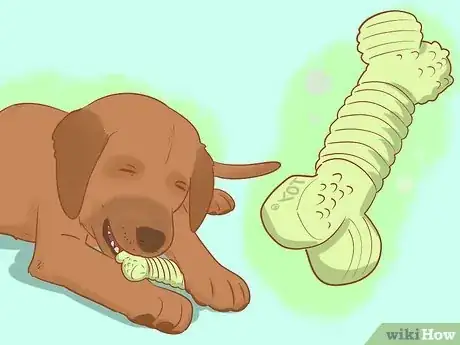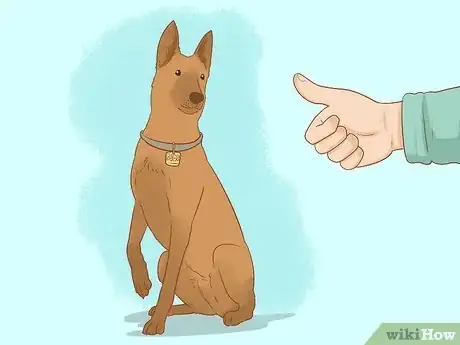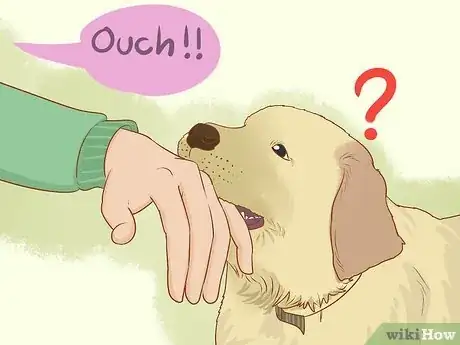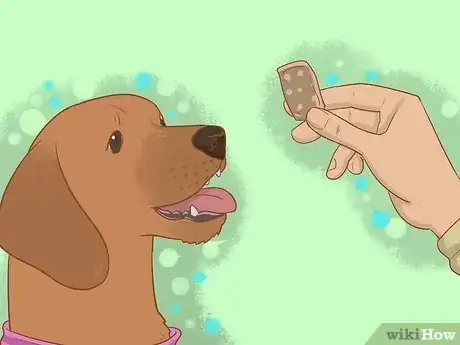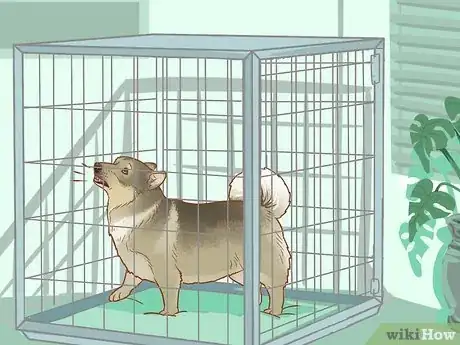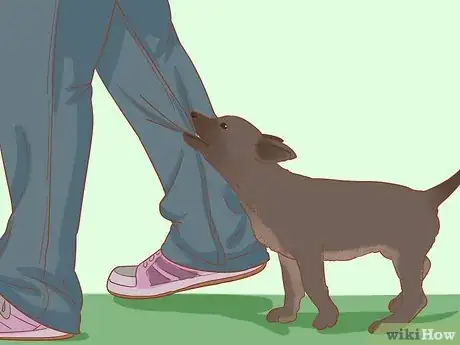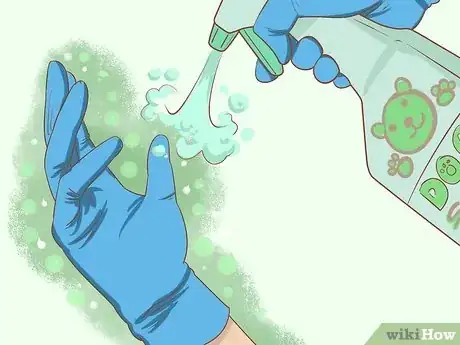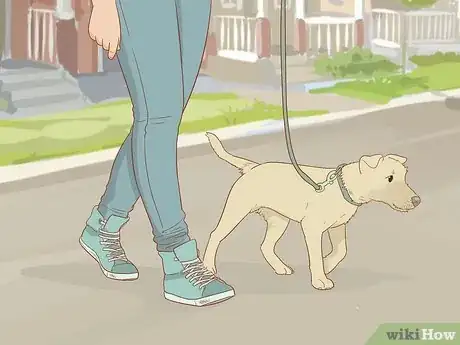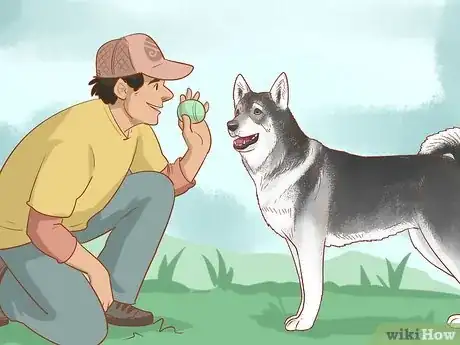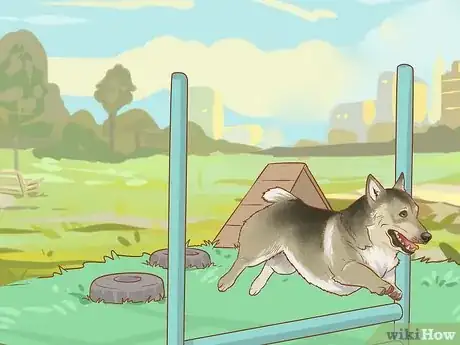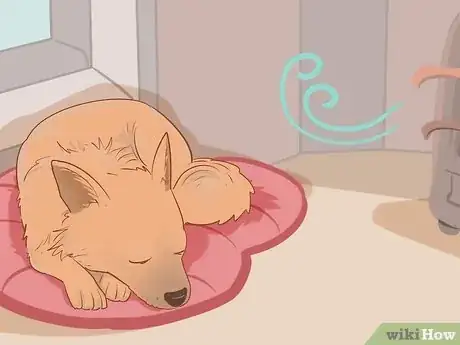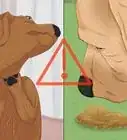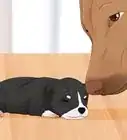This article was written by Jessica Powell and by wikiHow staff writer, Hannah Madden. Jessica is a Certified Professional Dog Trainer and the Owner of Proud Paws Dog Training, a small business offering private coaching and in-home dog training services to dog parents across the San Fernando Valley of Los Angeles, California. With nearly ten years of experience, she has extensive knowledge and experience in dog behavior, effective communication techniques, animal welfare, manners training, behavioral modification, and enrichment. Jessica holds a Bachelor of Science degree in Animal Management and is also an experienced shelter professional.
This article has been viewed 8,364 times.
While a puppy nipping at your fingers might be cute, an adult dog biting your hands when they’re excited is a bit more concerning. Your dog might be biting because they want to play, because they’re trying to calm down, or even because they think you like it. Fortunately, no matter why your dog is biting, there are training tactics you can use to curb their behavior and get them to stop. In this article, we’ll give you the best professional-backed advice to train your dog and stop them from nipping you and other people.
This article is based on an interview with our certified professional dog trainer, Jessica Powell, owner of Proud Paws Dog Training. Check out the full interview here.
Steps
Offer your dog a chew toy.
-
Redirect your dog’s chewing to something positive, like a toy. Your dog might be nipping to self-soothe or because they’re overwhelmed. In that case, a soft chew toy is a great stand-in for your hand. When your dog nips at you, calmly move away, then offer them a chew toy instead. Over time, they’ll understand that instead of biting you, they should bite their toys.[1] X Trustworthy Source American Society for the Prevention of Cruelty to Animals Leading organization dedicated to the prevention of animal cruelty Go to source
- Training your dog takes time, and you may have to offer them a chew toy over and over again before they make the connection in their head.
Give your dog a command.
-
Make your dog focus on a command so they stop biting. If your dog nips you or anyone else, tell them to “sit,” “stay,” or “leave it.” When they follow your directions, reward them for good behavior by offering them a treat or a toy.[2] X Trustworthy Source American Society for the Prevention of Cruelty to Animals Leading organization dedicated to the prevention of animal cruelty Go to source
- Dogs will often bite in excitement because they’re overstimulated. If you can get their mind to focus on something else, they may calm down enough to stop nipping.
- If your dog is a puppy, work on teaching them basic commands so they can follow your directions.
Say “Ouch!” when your dog bites.
-
Let your dog know that they’re hurting you so they back off. Your dog might not realize that their bites actually hurt you, since many dogs bite as a form of play. When your dog bites, let your hand go completely limp, then say “Ouch!” loudly but firmly.[3] X Trustworthy Source American Society for the Prevention of Cruelty to Animals Leading organization dedicated to the prevention of animal cruelty Go to source
- Try not to jerk your hand away or squeal loudly, since your dog might see those as a sign that you’re playing. Instead, keep your voice calm and your movements slow.
Offer your dog a treat for good behavior.
-
Positive reinforcement, like treats, tells your dog what they should be doing. If you notice that your dog isn’t biting, or if they follow your commands to stop biting, give them a treat as a reward. Not only will it strengthen your bond, but it will teach your dog that not biting is a good thing.[4] X Trustworthy Source Animal Humane Society Leading animal welfare nonprofit organization providing medical care, training education, and resources for animal owners Go to source
- In general, using positive reinforcement with dogs is more effective than negative reinforcement, because it tells your dog what they should be doing rather than scaring them into submission.
Put your dog in a crate or time-out area.
-
Use “detention” as a way to calm your dog down. When your dog bites because they’re excited, calmly but firmly lead them to their crate or another room. They don’t have to stay in for long—let them out when they’re no longer super excited or overstimulated.[5] X Trustworthy Source Animal Humane Society Leading animal welfare nonprofit organization providing medical care, training education, and resources for animal owners Go to source
- You can tell your dog is calm when they lie down on their own without a command. You can also tell they’ve calmed down once they aren’t barking or jumping when you enter the room.
- With enough repetition, your dog will understand that biting means they have to leave the room, and they’ll avoid the behavior.
Ignore your dog when they bite or nip.
-
Don’t give your dog any attention, since that could encourage them. Turn away from your dog and let them calm down on their own. Once a few minutes have passed, turn back toward them and try petting them or offering them a chew toy.[6] X Research source
- This is a great tactic to try if you think your dog is biting to get your attention.
Wear gloves with a taste deterrent.
-
Make your hands taste bad so your dog tries not to bite them. If you’ve tried a few other methods and they aren’t working, buy some cotton gloves and coat them with a taste deterrent that makes them smell and taste bad. When your dog nips your hands, they’ll be disgusted by the taste, and they hopefully won’t try to bite you again.[7] X Research source
- You’ll have to wear your cotton gloves multiple times for your dog to make the connection in their head.
- Keep in mind that if your dog is smart or good at recognizing patterns, this tactic may not work. Your dog might make the connection that gloved hands taste bad, but ungloved ones don’t.
Keep your dog on a leash.
-
Hold your dog close to you so that they can’t bite other people. If your dog likes to nip strangers or guests in your home, the best way to deter them is to keep them from biting at all. When your dog sees someone and gets excited, keep them on a leash and hold them close to you. Then, let your friend or a stranger pet them once they’ve calmed down.[8] X Trustworthy Source Animal Humane Society Leading animal welfare nonprofit organization providing medical care, training education, and resources for animal owners Go to source
- If your dog likes to bite or nip you on walks, try a Gentle Leader. This harness goes over your dog’s snout so you can direct their mouth where you want it to go.
Avoid physical punishments.
-
Scare tactics and punishments only make your dog feel afraid. Don’t use tactics like spray bottles, holding your dog by the muzzle, pinning them down, or making loud noises at them. Your dog will only learn that they should be afraid of you, and they won’t make the connection that biting is bad.[9] X Trustworthy Source American Society for the Prevention of Cruelty to Animals Leading organization dedicated to the prevention of animal cruelty Go to source
Exercise your dog daily.
-
Let them burn off their energy so they’re less likely to bite. When your dog is tired, they’re much less likely to expend energy by biting or nipping you. Make sure you take your dog on walks every day, and give them plenty of toys and treats to stimulate their minds, too.[10] X Trustworthy Source American Kennel Club The American Kennel Club (AKC) is a purebred dog pedigree registry in the United States. The AKC advocates for the responsible ownership of dogs and promotes purebred dog events, such as the Westminster Dog Show. Go to source
- Your specific dog breed may need more exercise than others. In general, high-energy large dogs need more exercise, while low-energy small dogs need less.[11] X Trustworthy Source American Kennel Club The American Kennel Club (AKC) is a purebred dog pedigree registry in the United States. The AKC advocates for the responsible ownership of dogs and promotes purebred dog events, such as the Westminster Dog Show. Go to source
- Food puzzles are a great way to mentally stimulate your dog during meal times.
Let your dog rest when they’re tired.
-
Give your dog a chance to rest so they don’t bite out of overstimulation. Dogs will sometimes give a warning bite when they need space. If your dog is tired or overwhelmed, they may be biting because they want people to stay away from them. Be sure your dog has a safe, comfortable place to lie down, like a bed or a crate. Give them a chance to rest and recover after exercise so they feel happy and ready to play again.
Warnings
- If your dog is biting hard enough to break the skin, contact a professional dog trainer. They can asses your dog's behavior and tell you exactly what you need to do to stop their biting.⧼thumbs_response⧽
You Might Also Like
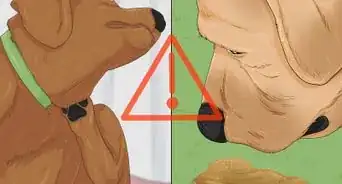

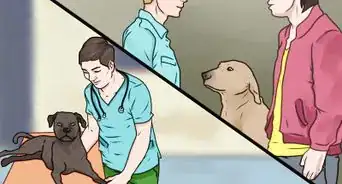
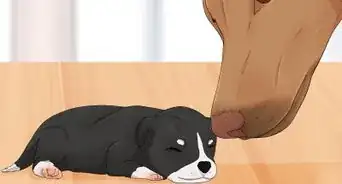
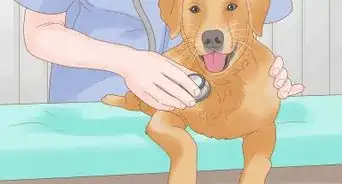 12 Simple, Effective Home Remedies to Stop a Dog from Licking Its Paws
12 Simple, Effective Home Remedies to Stop a Dog from Licking Its Paws
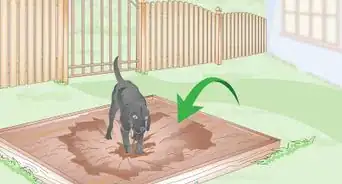
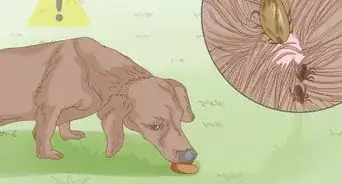
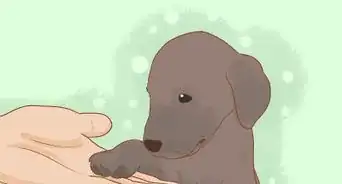
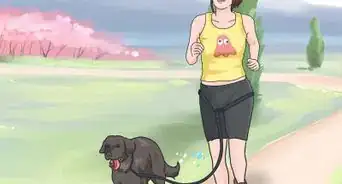

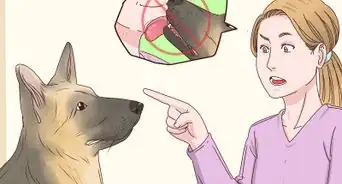
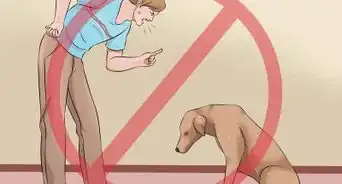
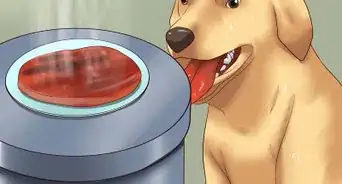
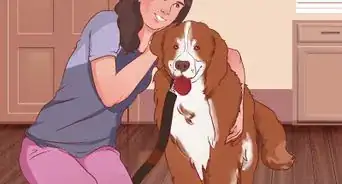
References
- ↑ https://www.aspca.org/pet-care/dog-care/common-dog-behavior-issues/mouthing-nipping-and-play-biting-adult-dogs
- ↑ https://www.aspca.org/pet-care/dog-care/common-dog-behavior-issues/mouthing-nipping-and-play-biting-adult-dogs
- ↑ https://www.aspca.org/pet-care/dog-care/common-dog-behavior-issues/mouthing-nipping-and-play-biting-adult-dogs
- ↑ https://www.animalhumanesociety.org/behavior/managing-mouthing-dogs
- ↑ https://www.animalhumanesociety.org/behavior/managing-mouthing-dogs
- ↑ https://www.paws.org/resources/nipping-and-rough-play/
- ↑ https://www.paws.org/resources/nipping-and-rough-play/
- ↑ https://www.animalhumanesociety.org/behavior/managing-mouthing-dogs
- ↑ https://www.aspca.org/pet-care/dog-care/common-dog-behavior-issues/mouthing-nipping-and-play-biting-adult-dogs
About This Article

